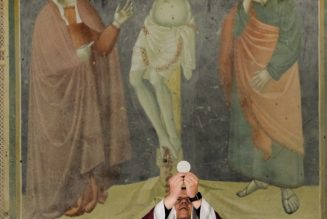By Dr. Jeff Mirus ( bio – articles – email ) | Mar 07, 2023
I want to revisit the angst expressed by Cardinal Robert McElroy over the Church’s “failure” to fully include “LGBT communities”. Perhaps, for example, readers are not familiar with the astonishing claims McElroy made in his first article in America magazine. For it is not (as McElroy alleged in a second article) that the Church places a novel and unhealthy emphasis on the seriousness of sexual sins. Rather, the Cardinal put it this way:
It is a demonic mystery of the human soul why so many men and women have a profound and visceral animus toward members of the L.G.B.T. communities. The church’s primary witness in the face of this bigotry must be one of embrace rather than distance or condemnation. The distinction between orientation and activity cannot be the principal focus for such a pastoral embrace because it inevitably suggests dividing the L.G.B.T. community into those who refrain from sexual activity and those who do not. Rather, the dignity of every person as a child of God struggling in this world, and the loving outreach of God, must be the heart, soul, face and substance of the church’s stance and pastoral action.
Now we must remember that McElroy is writing not about preaching the Gospel to “LGBT communities” but about their radical inclusion in the Church. Given the context, this is the pivotal statement, and it fosters two serious misconceptions. First, we note that if there is indeed a “visceral animus toward members of the L.G.B.T communities”, this animus is quite properly linked to what we should more accurately describe as a “visceral aversion” to seriously disordered sexual practices. Such an aversion is actually a sign of something healthy in our own human sexuality. One grants that an aversion to a practice ought not to be the same thing as an animus toward a person, but the two are inescapably related. The problem is that, right from the jump, Cardinal McElroy is so obviously obscuring the real issue as to open himself to the charge of doing so deliberately. It is not demonic but good when our emotions are aligned with the reality that sexual attraction between the male and the female has been designed by God, even if this too is subject to abuse.
Now this point brings us to the second and more egregious claim made by the Cardinal in the same paragraph, namely that the Church’s full inclusion of “L.G.B.T” communities cannot be based on a division between refraining from immoral sexual activity and engaging in it. But of course this is also deliberately misleading, and in fact nonsensical on its face. The very issue at stake in full communion with the Catholic Church is not whether we sometimes sin, but whether we uphold as good what Christ and the Church teach to be evil; or condemn as evil what Christ and the Church teach to be good. Manifestly, if our “lifestyle choice” is publicly opposed to the moral teachings of the Catholic Church, we cannot expect the Church to say that we are in communion with her.
In this respect, the very identification of persons as part of what Cardinal McElroy so glibly describes as “L.G.B.T. communities” is precisely what prevents their “radical inclusion” in the Catholic Church. Again, it is not the fact that someone sins which excludes from full communion in the Mystical Body of Christ. Every Catholic sins. Rather, it is upholding immoral practices as a source of pride that excludes from communion. Not all sexual practices are consonant with our human nature; not all respect the virtue of chastity. It is precisely the insistence that an immoral sexual lifestyle must be recognized by the Church as right and good that creates the barrier: The insistence that the Church may not call you to repentance; the demand that the Church change her teachings on good and evil to accommodate your sinfulness.
With respect to sexual sins, there is never any objection to a Catholic who strives for chastity and repents if he falls. No, it is the demand that the Church either turn a blind eye or call black white that excludes the unrepentant sinner from inclusion in the Body of Christ.
The McElroy fallacy
Under fire, Cardinal McElroy has attempted to justify his demand for “full inclusion of LGBT communities” in the Church by insisting that the Church’s emphasis on the severity of sexual sin was a theological invention of the seventeenth-century. Others have already demolished that argument simply through accurate reporting on what McElroy said and what he failed to say (see, for example, our Catholic World News story on this subject: Cardinal McElroy: Catholic teaching on grave nature of ‘all sexual sins’ is 17th-century innovation). But it is important to notice further that this issue is a red herring—that is, an assertion irrelevant to the argument at hand. It has been introduced to divert attention from the real point.
The point, as Cardinal McElroy cannot help knowing, is that nobody is eligible for “full inclusion” in the Church while at the same time publicly demanding the acceptance of behavior that this same Church teaches to be morally wrong. From an outward institutional point of view, of course, any Catholic or would-be Catholic can enjoy “full inclusion” in the Church no matter what his beliefs or sins simply by keeping them private. Obviously, the Church hopes that nobody will choose to be Catholic while secretly refusing acceptance of the Catholic faith. Obviously the Church assumes that anyone who expresses assent to Catholic faith and morals will recognize that claiming the Catholic name is incompatible with the open justification of any belief or behavior which the Church authoritatively teaches to be objectively false or evil.
The Church knows, after all, that her members are not only imperfect but actual sinners. What she claims over her members is the right and duty to teach them the truth about God and His plan for our eternal happiness, and the truth about virtue and vice, how to grow in the former and conquer the latter. She excludes no one who accepts her authority to represent Jesus Christ in these matters. She does not exclude those who struggle; she excludes only those who publicly deny her Divinely constituted authority.
The Catholic Church does not regard herself as a worldly club through which sinners may grow in social acceptance. She regards herself as a Divine institution instituted for the reclamation of sinners and their transforming incorporation into Christ. Those who refuse to accept the veracity of her authority cannot benefit from her ministry. Those who act in public defiance of her teachings cannot remain in full communion with her. This does not arise from her changeable decision but by virtue of what she is. All are welcome who recognize her identity and strive over time to become ever more worthy of her gifts. But those cannot be welcome who demand as a condition of their inclusion that the Church betray her identity by calling good evil, or evil good.
To put this problem in a merely human context, just as a human organization cannot maintain its mission by including members who deny that mission, no divine organization could possibly maintain its mission by modifying that mission to accommodate those who deny it. This has nothing to do with the peculiar way theologians may (or may not) have expressed the severity of different kinds of sin in any particular place or period; it has everything to do with the refusal (and even inability) of Jesus Christ to incorporate into His Mystical Body those who insist that He change reality to suit their own particular temptations, or who claim that any temptation to evil is Divinely inspired, or that any sin is Divinely sanctioned.
False identification of the sinner with the sin
We face here a quintessential modern ambivalence about reality, a tendency to reduce reality to human desire. It therefore comes as a shock that one cannot expect full inclusion in the Catholic Church while in open denial of her teachings, still less on the condition that the Church honor and embrace that denial as spiritually and morally legitimate. The inability to appreciate such an internal contradiction is a product of our incorporation into a social order—a dominant culture—which so often insists that black is white and white is black, to the point of convincing a large majority of those who are habituated to this culture that the only reasons any person or institution could possibly hold a contrary view are ignorance or meanness. But what we have here instead is the inevitable clash between a Divine institution and the world it so very definitely claims the authority to judge.
Sexual attractions of every kind, of the wrong type or in the wrong circumstances, carry with them strong emotions which confuse us about the nature of both love and happiness. This can be true even between a husband and wife in marriage, as the practice of contraception makes painfully clear. But in addition to the temptations felt in the body, the mind also feels the temptation to justify our inclinations. Further confusion inescapably arises from the weaknesses of the Church’s members more generally, who struggle to be in but not of the world, struggles which afflict even the Church’s own leaders. The whole issue becomes even more difficult when the larger culture in which we live has elevated sexual license into either a legitimate choice or an inescapable lifestyle. Thus do people with different sexual temptations fall into the trap of identifying themselves with their temptations, insisting not only that their temptations are natural and good, but that they should be honored for them.
Our Lord Himself called attention to all these confusions when he so seriously condemned scandal, as recorded here by St. Luke: “Temptations to sin are sure to come; but woe to him by whom they come! It would be better for him if a millstone were hung round his neck and he were cast into the sea, than that he should cause one of these little ones to sin” (Lk 17:1-2). St. Matthew reported Our Lord’s teaching on this point with even greater force:
Woe to the world for temptations to sin! For it is necessary that temptations come, but woe to the man by whom the temptation comes! And if your hand or your foot causes you to sin, cut it off and throw it away; it is better for you to enter life maimed or lame than with two hands or two feet to be thrown into the eternal fire. And if your eye causes you to sin, pluck it out and throw it away; it is better for you to enter life with one eye than with two eyes to be thrown into the hell of fire. [18:7-9]
Our Lord intended some of his warnings for the protection of children, and indeed we are all children of His Father and children of the Church. Perhaps we are never more deeply children than when we rely on the Church to give us all that we need to come close to our Father in Heaven. Yet the dominant project in academic moral theology in the second half of the twentieth century was an adolescent self-justification of sexual sin based on alleged sociological discoveries about the sexual proclivities of the modern secular world and its professors. What a scandal, then—what an indescribably gargantuan stink of a scandal—when a prince of the Church himself champions the cause of those who demand Christ’s acceptance not of their resistance to the temptation but of their deliberate, habitual, self-promotional and self-defining participation in the sin.
The problem with the entire LGBTQ… movement is that it seeks to define people by the wayward inclinations of their fallen human nature. Those who insist on defining themselves in this way are not seeking redemption from sin; they are demanding acceptance of sin. This is just another case of the masterful psychology expressed in John 3:20-21: “For every one who does evil hates the light, and does not come to the light, lest his deeds should be exposed. But he who does what is true comes to the light, that it may be clearly seen that his deeds have been wrought in God.” Many are confused about this through no serious fault of their own, but Church leaders do them no service by shielding them from the light Christ sheds on the self-justifying demands of our concupiscence.
Conclusion
The world has always been plagued by sexual sin because our sexuality is such a potent natural component of our human nature. While some never experience significant sexual temptation, surely this exemption is relatively rare. Paul VI already recognized in the mid-twentieth century the deep connections between contraception (the manipulation of our sexuality to make it sterile) and homosexuality and other sexual and deep familial ills which partake in the same sterile selfishness. One can (and certainly should) argue that the widespread use of contraceptives among Catholics is a grave scandal. It certainly creates cases of the pot calling the kettle black. But it is not often a point on which people publicly self-identify in order to seek “full inclusion” despite their defense of the practice.
There is a difference between attempting to police those who sin against Christ and the Church in secret and excluding those who insist that the Church must accept their open denial of her teachings. We are all sinners; but we do not all seek to justify our sins publicly. It is not a good thing to slide along in silence. But though faults hidden by silence do not bode well for spiritual growth, neither can inward rebellion be identified as an obstacle to outward inclusion. Owing to the limits of human perception, there is a necessary difference between what the Church must separate now in order to preserve the identity and integrity of her mission, and what Christ must separate at harvest time.
It is of course very sad that those who experience same-sex attraction (and many other attractions) find themselves now part of a pagan, secular culture which insists on justifying these temptations as wholesome and good. It is even sadder that they are often confused by the echoes of this justification even among the Church’s ministers. It is precisely this that renders Cardinal McElroy’s word games so wearisomely puerile. How often has Christ wished to gather all the children of His Father together as a hen gathers her brood under her wings, but we would not! (Mt 23:37; Lk 13:34) Is it even remotely credible that Cardinal McElroy does not understand this to be a case of “would not”?
That is the issue here; and that has always been the issue. When the heart turns to Christ in the Church, and accepts the Revelation the Church guarantees, all obstacles disappear, despite moral lapses and the recurrent need for grace. But in the absence of that turning and that acceptance, the only obstacle that matters still remains: The great, self-justifying “would not”. Any Churchman who obscures that distinction obscures the Church. Any Churchman who betrays that reality betrays not only Christ but the souls Christ seeks.
Sound Off! CatholicCulture.org supporters weigh in.
All comments are moderated. To lighten our editing burden, only current donors are allowed to Sound Off. If you are a current donor, log in to see the comment form; otherwise please support our work, and Sound Off!










